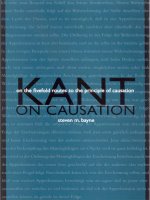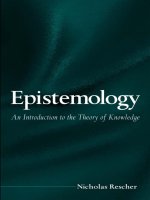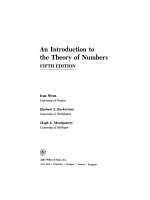state university of new york press epistemology an introduction to the theory of knowledge aug 2003
Bạn đang xem bản rút gọn của tài liệu. Xem và tải ngay bản đầy đủ của tài liệu tại đây (2.33 MB, 425 trang )
Epistemology
SUNY series in Philosophy
George R. Lucas Jr., editor
Epistemology
An Introduction to the Theory of Knowledge
Nicholas Rescher
State University of New York
Published by
State University of New York Press, Albany
© 2003 State University of New York
All rights reserved
Printed in the United States of America
No part of this book may be used or reproduced in any manner whatsoever
without written permission. No part of this book may be stored in a retrieval
system or transmitted in any form or by any means including electronic,
electrostatic, magnetic tape, mechanical, photocopying, recording, or otherwise
without the prior permission in writing of the publisher.
For information, address State University of New York Press,
90 State Street, Suite 700, Albany, NY 12207
Production by Michael Haggett
Marketing by Anne M. Valentine
Library of Congress Cataloging-in-Publication Data
Rescher, Nicholas.
Epistemology : an introduction to the theory of knowledge / Nicholas
Rescher.
p. cm. — (SUNY series in philosophy)
Includes bibliographical references and index.
ISBN 0-7914-5811-3 (alk. paper) — ISBN 0-7914-5812-1 (pbk. : alk.
paper)
1. Knowledge,Theory of. I. Title. II. Series
BD161R477 2003
121—dc21
2003057270
10987654321
v
Contents
Preface xi
Introduction xiii
KNOWLEDGE AND ITS PROBLEMS
Chapter 1: Modes of Knowledge 3
I
S KNOWLEDGE TRUE JUSTIFIED BELIEF?3
MODES OF (PROPOSITIONAL) KNOWLEDGE 7
OTHER BASIC PRINCIPLES 10
Chapter 2: Fallibilism and Truth Estimation 15
PROBLEMSOFMETAKNOWLEDGE16
THE PREFACE PARADOX 19
THE DIALLELUS 22
AN APORY AND ITS RECONCILIATION:
K-DESTABILIZATION 23
COSTS AND BENEFITS 26
MORE ON FALLIBILISM 27
THE COMPARATIVE FRAGILITY OF SCIENCE:
SCIENTIFICCLAIMSASMEREESTIMATES30
F
ALLIBILISM AND THE DISTINCTION BETWEEN
OUR (PUTATIVE) TRUTH AND THE REAL TRUTH 34
Chapter 3: Skepticism and Its Deficits 37
T
HE SKEPTIC’S “NO CERTAINTY”ARGUMENT 37
THE ROLE OF CERTAINTY 39
THE CERTAINTY OF LOGIC VERSUS
THE
CERTAINTY OF LIFE 41
PRAGMATIC INCONSISTENCY 42
SKEPTICISM AND RISK 45
RATIONALITY AND COGNITIVE RISK 49
T
HE ECONOMIC DIMENSION:COSTS AND BENEFITS 53
THE DEFICIENCY OF SKEPTICISM 56
Chapter 4: Epistemic Justification in a Functionalistic and
Naturalistic Perspective 61
E
XPERIENCE AND FACT 61
PROBLEMS OF COMMON-CAUSE EPISTEMOLOGY 62
MODES OF JUSTIFICATION 64
T
HE EVOLUTIONARY ASPECT OF SENSORY EPISTEMOLOGY 68
RATIONAL VERSUS NATURAL SELECTION 69
A
GAINST “PURE”INTELLECTUALISM 74
THE PROBLEM OF ERROR 76
CONCLUSION 78
Chapter 5: Plausibility and Presumption 81
T
HE NEED FOR PRESUMPTIONS 81
THE ROLE OF PRESUMPTION 85
PLAUSIBILITY AND PRESUMPTION 87
P
RESUMPTION AND PROBABILITY 90
PRESUMPTION AND SKEPTICISM 92
HOW PRESUMPTION WORKS:WHAT JUSTIFIES
PRESUMPTIONS 96
Chapter 6: Trust and Cooperation in Pragmatic Perspective 101
T
HE COST EFFECTIVENESS OF SHARING AND COOPERATING
IN
INFORMATION ACQUISITION AND MANAGEMENT 101
THE ADVANTAGES OF COOPERATION 103
BUILDING UP TRUST:AN ECONOMIC APPROACH 104
TRUST AND PRESUMPTION 106
A COMMUNITY OF INQUIRERS 108
RATIONAL INQUIRY AND THE QUEST FOR TRUTH
Chapter 7: Foundationalism and Coherentism 113
H
IERARCHICAL SYSTEMIZATION:THE EUCLIDEAN
MODEL OF KNOWLEDGE 113
CYCLIC SYSTEMIZATION:THE NETWORK MODEL—
AN ALTERNATIVE TO THE EUCLIDEAN MODEL 118
vi Contents
THE CONTRAST BETWEEN FOUNDATIONALISM
AND
COHERENTISM 123
PROBLEMS OF FOUNDATIONALISM 128
Chapter 8: The Pursuit of Truth: Coherentist Criteriology 131
T
HE COHERENTIST APPROACH TO INQUIRY 131
THE CENTRAL ROLE OF DATA FOR A COHERENTIST
TRUTH-CRITERIOLOGY 135
ON VALIDATING THE COHERENCE APPROACH 139
IDEAL COHERENCE 145
TRUTH AS AN IDEALIZATION 147
Chapter 9: Cognitive Relativism and Contexualism 151
C
OGNITIVEREALISM152
WHAT’SWRONGWITHRELATIVISM154
THE CIRCUMSTANTIAL CONTEXTUALISM OF REASON 155
A FOOTHOLD OF ONE’S OWN:THE PRIMACY OF OUR
OWN POSITION 159
THE ARBITRAMENT OF EXPERIENCE 161
AGAINST RELATIVISM 165
CONTEXTUALISTIC PLURALISM IS COMPATIBLE WITH
COMMITMENT ON PURSUING “THE TRUTH” 168
THE ACHILLES’HEEL OF RELATIVISM 170
Chapter 10: The Pragmatic Rationale of Cognitive Objectivity 173
O
BJECTIVITY AND THE CIRCUMSTANTIAL UNIVERSITY
OF
REASON 173
THE BASIS OF OBJECTIVITY 175
THE PROBLEM OF VALIDATING OBJECTIVITY 177
WHAT IS RIGHT WITH OBJECTIVISM 180
ABANDONING OBJECTIVITY IS PRAGMATICALLY
SELF-DEFEATING 182
Chapter 11: Rationality 187
S
TAG E-SETTING FOR THE PROBLEM 187
OPTIMUM-INSTABILITY 188
IDEAL VERSUS PRACTICAL RATIONALITY:THE
PREDICAMENT OF REASON 190
THE PROBLEM OF VALIDATING RATIONALITY 193
THE PRAGMATIC TURN:EVEN COGNITIVE
RATIONALITY HAS A PRAGMATIC RATIONALE 196
Contents vii
ALTERNATIVE MODES OF RATIONALITY? 198
THE SELF-RELIANCE OF RATIONALITY IS NOT
VICIOUSLY CIRCULAR 203
COGNITIVE PROGRESS
Chapter 12: Scientific Progress 209
T
HE EXPLORATION MODEL OF SCIENTIFIC INQUIRY 210
THE DEMAND FOR ENHANCEMENT 211
TECHNOLOGICAL ESCALATION:AN ARMS RACE
AGAINST NATURE 212
T
HEORIZING AS INDUCTIVE PROJECTION 215
LATER NEED NOT BE LESSER 217
C
OGNITIVE COPERNICANISM 221
THE PROBLEM OF PROGRESS 223
Chapter 13: The Law of Logarithmic Returns and the
Complexification of Natural Science 229
THE PRINCIPLE OF LEAST EFFORT AND THE
METHODOLOGICAL STAT US O F SIMPLICITY-PREFERENCE
IN
SCIENCE 230
C
OMPLEXIFICATION 234
THE EXPANSION OF SCIENCE 239
THE LAW OF LOGARITHMIC RETURNS 240
THE RATIONALE AND IMPLICATIONS OF THE LAW
OF
LOGARITHMIC RETURNS 245
THE GROWTH OF KNOWLEDGE 248
THE DECELERATION OF SCIENTIFIC PROGRESS 251
PREDICTIVE IMPLICATIONS OF THE INFORMATION/
KNOWLEDGE RELATIONSHIP 253
THE CENTRALITY OF QUALITY AND ITS IMPLICATIONS 254
Chapter 14: The Imperfectability of Knowledge: Knowledge as
Boundless 257
C
ONDITIONS OF PERFECTED SCIENCE 257
THEORETICAL ADEQUACY:ISSUES OF EROTETIC
COMPLETENESS 259
PRAGMATIC COMPLETENESS 262
PREDICTIVE COMPLETENESS 264
TEMPORAL FINALITY 267
viii Contents
“PERFECTED SCIENCE”ASANIDEALIZATION THAT
AFFORDS A USEFUL CONTRAST CONCEPTION 271
THEDISPENSABILITYOFPERFECTION274
COGNITIVE LIMITS AND THE QUEST FOR TRUTH
Chapter 15: The Rational Intelligibility of Nature 279
E
XPLAINING THE POSSIBILITY OF NATURAL SCIENCE 279
“OUR”SIDE 282
NATURE’S SIDE 284
SYNTHESIS 287
I
MPLICATIONS 289
Chapter 16: Human Science as Characteristically Human 293
T
HE POTENTIAL DIVERSITY OF “SCIENCE” 293
THE ONE WORLD,ONE SCIENCE ARGUMENT 297
A QUANTITATIVE PERSPECTIVE 299
COMPARABILITY AND JUDGMENTS OF RELATIVE
ADVANCEMENT OR BACKWARDNESS 305
BASIC PRINCIPLES 308
Chapter 17: On Ignorance, Insolubilia, and the Limits of Knowledge 315
CONCRETE VERSUS GENERIC KNOWLEDGE AND
IGNORANCE316
EROTETIC INCAPACITY 317
DIVINE VERSUS MUNDANE KNOWLEDGE 318
ISSUES OF TEMPORALIZED KNOWLEDGE 319
KANT’S PRINCIPLE OF QUESTION EXFOLIATION 321
COGNITIVE INCAPACITY 323
INSOLUBILIA THEN AND NOW 324
COGNITIVE INCAPACITY 325
IDENTIFYING INSOLUBILIA 327
RELATING KNOWLEDGE TO IGNORANCE 329
P
OSTSCRIPT:A COGNITIVELY INDETERMINATE
UNIVERSE 330
Chapter 18: Cognitive Realism 333
E
XISTENCE334
ISMANTHEMEASURE?335
REALISMANDINCAPACITY337
Contentsix
THE COGNITIVE OPACITY OF REAL THINGS 339
THE COGNITIVE INEXHAUSTIBILITY OF THINGS 341
THE CORRIGIBILITY OF CONCEPTIONS 343
T
HE COGNITIVE INEXHAUSTIBILITY OF THINGS 344
COGNITIVE DYNAMICS 345
CONCEPTUAL BASIS OF REALISM AS A POSTULATE 347
HIDDEN DEPTHS:THE IMPETUS TO REALISM 352
THE PRAGMATIC FOUNDATION OF REALISM AS A BASIS
FOR
COMMUNICATION AND DISCOURSE 355
THE IDEALISTIC ASPECT OF METAPHYSICAL REALISM 360
SCIENCE AND REALITY 361
Notes 369
Index 403
x Contents
xi
PREFACE
This book is based on work in epistemology extending over several
decades. It combines into a systematic whole ideas, arguments, and doctrines
evolved in various earlier investigations. The time has at last seemed right to
combine these deliberations into a single systematic whole and this book is the
result.
Philosophers are sometimes heard to say that the present is a post-episte-
mological era and that epistemology is dead. But this is rubbish. If the time
ever came when people ceased to care for epistemological questions—as illus-
trated by the topics treated in the present book—it would not be just episte-
mology that has expired but human curiosity itself.
I am grateful to Estelle Burris for her competence and patience in putting
this material into a form where it can meet the printer’s needs.
Nicholas Rescher
Pittsburgh
March 2002
This page intentionally left blank.
xiii
Introduction
The mission of epistemology, the theory of knowledge, is to clarify what the
conception of knowledge involves, how it is applied, and to explain why it has
the features it does. And the idea of knowledge at issue here must, in the first in-
stance at least, be construed in its modest sense to include also belief, conjecture,
and the like. For it is misleading to call cognitive theory at large “epistemology”
or “the theory of knowledge.” Its range of concern includes not only knowledge
proper but also rational belief, probability, plausibility,evidentiation and—addi-
tionally but not least—erotetics, the business of raising and resolving questions.
It is this last area—the theory of rational inquiry with its local concern for ques-
tions and their management—that constitutes the focus of the present book. Its
aim is to maintain and substantiate the utility of approaching epistemological is-
sues from the angle of questions. As Aristotle already indicated, human inquiry
is grounded in wonder. When matters are running along in their accustomed
way, we generally do not puzzle about it and stop to ask questions. But when
things are in any way out of the ordinary we puzzle over the reason why and seek
for an explanation. And gradually our horizons expand. With increasing sophis-
tication, we learn to be surprised by virtually all of it. We increasingly want to
know what makes things tick—the ordinary as well as the extraordinary, so that
questions gain an increasing prominence within epistemology in general.
Any profitable discussion of knowledge does well to begin by recognizing
some basic linguistic facts about how the verb to know and its cognates actually
function in the usual range of relevant discourse. For if one neglects these facts
one is well en route to “changing the subject” to talk about something different
from that very conception that must remain at the center of our concern. It would
clearly be self-defeating to turn away from knowledge as we in fact conceive and
discuss it and deal with some sort of so-called knowledge different from that
whose elucidation is the very reason for being so such a theory. If a philosophical
analysis is to elucidate a conception that is in actual use, it has no choice but to
address itself to that usage and conform to its actual characteristics.
The first essential step is to recognize that “to know” has both a proposi-
tional and a procedural sense: there is the intellectual matter of “knowing that
something or other is the case” (that-knowledge) and the practical matter of
knowing how to perform some action and to go about realizing some end
(how-to-knowledge).This distinction is crucial because only the former, intel-
lectual and propositional mode of knowledge has generally been the focus of
attention in traditional philosophical epistemology, rather than the latter,
practical and performatory mode. We shall accordingly focus here on specifi-
cally propositional knowledge—that sort of knowledge which is at issue in lo-
cutions to the effect that someone knows something-or-other to be the case
(“x knows that p”).
The terminology at issue generally so operates that in flatly saying that “X
knows that p” one not only gives a report about X ’s cognitive posture, but also
endorses the proposition P that is at issue. To disengage oneself from this com-
mitment one must say something like, “X thinks (or is convinced) that he
knows that p.” In the present discussion, however, it will be just this latter sort
of thing—apparent or purported knowledge—that is under consideration.
Knowledge claims can be regarded from two points of view, namely, inter-
nally and committally, subject to an acceptance thereof as correct and authentic,
and externally and detachedly, viewed from an “epistemic distance” without the
commitment of actual acceptance, and seen as merely representing purported
knowledge. We shall here adopt this second perspective, viewing knowledge in
an externalized way, so that we shall be dealing with ostensible knowledge rather
than certifiedly authentic knowledge. Our concern is with the merely putative
knowledge of fallible flesh-and-blood humans and not the capital-K Knowl-
edge of an omniscient being.
There is a wide variety of cognitive involvements: one can know, believe or
accept (disbelieve or reject), conjecture or surmise or suspect, imagine or think
about, assume or suppose, deem likely or unlikely, and so on. And there is also a
wide variety of cognitive performances: realizing, noticing, remembering,
wondering—and sometimes also their negatives: ignoring, forgetting, and so on.
All of these cognitive circumstances belong to “the theory of knowledge”—to
epistemology broadly speaking, which accordingly extends far beyond the do-
main of knowledge as such. But knowledge lies at the center of the range, and as
the very expression indicates, the “theory of knowledge” focuses on knowledge.
The conception of “knowledge” itself represents a flexible and internally
diversified idea. In general terms, it relates to the way in which persons can be
said to have access to correct information. This can, of course, occur in rather
different ways, so that there are various significantly distinguishable sorts of
knowledge in terms of the kind of thing that is at issue:
1. Knowledge-that something or other is the case (i.e., knowledge of
facts). Examples: I know that Paris is the capital of France. I know
that 2 plus 2 is 4.
2. Adverbial knowledge. Examples: Knowing what, when, how, why,and
so forth.
xiv Introduction
3. Knowledge by acquaintance with individuals or things. Examples: I
know Jones. I know the owner of that car.
4. Performatory (or “how-to”) knowledge. Examples: I know how to ice
skate. I know how to swim.
Traditionally epistemology, the theory of knowledge, has focused on
knowledge of the first type, propositional or factual knowledge of the sort
where “I know that bears are mammals” is paradigmatic. However, the present
book culminates in prioritizing the fourth sort of knowledge. It portrays the
pivotal use in practical terms, pivoting on the question of how we go about the
business of inquiry—of securing tenable answers to our questions.
As long as we are concerned merely with what we know, the idea of lim-
its of knowledge lies outside our ken. We cannot be specific about our igno-
rance in terms of knowledge: It makes no sense to say “p is a fact that I do not
know” for if we know something in specific to be a fact we can, for that very
reason, no longer be in ignorance about it. However, “Q is a question that I
cannot answer” poses no difficulty. It is thus only when we turn to ques-
tions—when we ask whether or not something is so in situations where we
simply cannot say—that we come up against the idea of limits to knowledge.
Only as we come to realize that there are questions that we cannot answer
does the reality of ignorance confront us. Accordingly, questions are episte-
mologically crucial because it is in their context that matters of unknowing—
also come to the fore. After all, we need information to remove ignorance and
settle doubt, and “our knowledge” is constituted by the answers that we ac-
cept. What people know—or take themselves to know—is simply the sum
total of the answers they offer to the questions they can resolve.
Propositional knowledge is coordinate with the capacity to answer ques-
tions, above all, in the case of knowledge-that-p, being in a position correctly
and appropriately to answer the question: “Is p true or not?” And it is this sort
of knowledge that will in the main, be at the focus of concern in the present
discussion because there is good reason for seeing it as basic to all modes of
knowledge in general.This sort of knowledge can further be classified
• by subject matter (as per mathematical or botanical knowledge)
• by source (personal observation, reliable reportage, etc.)
• by mode of justification or validation (personal or vicarious experience,
scientific investigation, mathematical calculation, etc.)
• by the cognitive status of the matters at issue (empirical facts, conven-
tion in linguistic matters, formal relationships in logic or mathematics)
• by mode of formulation (verbally, by pictograms, by mathematical
symbolism, etc.)
But what is propositional knowledge? It is emphatically not an activity or
performance. You cannot answer the question “What are you doing?” with the
Introduction xv
response “I am knowing that Paris is the capital of France,” any more than you
could say “I am owning this watch” or “I am liking roses.” Knowing a fact is not
something that one does; it is a condition one has come to occupy in relation to
information. It is not the process (buying, being inaugurated) but the end-state
(owning, being president) in which a process culminates. To know something,
then, is not to be engaged in an activity but to have entered into a certain con-
dition—a cognitive condition. In sum, propositional knowledge is a cognitive
affair—a condition of things coordinate with a suitable relationship between
people and facts. And it is this aspect of knowledge that will primarily concern
us here.
The fundamental features of propositional knowledge are inherent in the
modus operandi of knowledge discourse—in the very way in which language gets
used in this connection. The following three features are salient in this regard:
1. Truth Commitment. Only the truth can be known. If someone
knows that p then p must be true. It simply makes no sense to say “I
know that p, but it might not be true.” or “X knows that p but it
might not be true.” Only if one accepts p as true can one say of
someone that they know that p. If one is not prepared to accept that
p then one cannot say that someone knows it. Otherwise one has to
withdraw the claim that actual knowledge is at issue and rest content
with saying that the individual thinks or believes that he know that p.
2. Grounding. Knowledge must be appropriately grounded. A person
may accept something without a reason but cannot then be said to
know it. It makes no sense to say “X knows that p, but has no suffi-
cient grounds for thinking so.” Knowledge is not just a matter of be-
lief—or indeed even of correct belief—but of rationally appropriate
belief. Guesswork, conjecture, and so on are not a sufficient basis for
what deserves to be characterized as knowledge.
3. Reflexivity. To attribute a specific item of propositional knowledge
to someone else is ipso facto to claim it for oneself. It makes no sense
to say “You know that p, but I don’t.” Of course one can be generic
about it: “You know various things that I don’t.” But one cannot be
specific about it and identify these items. To characterize such an
item as knowledge is to assert one’s own entitlement to it.
4. Coherence. Since all items of propositional knowledge must be true,
they must in consequence be collectively coherent. It cannot be that
x knows that p but that y knows that not-p. Since we are committed
to the principle that the truth is consistent, the truth-commitment
of knowledge demands its consistency.
Knowledge development is a practice that we humans pursue because we
have a need for its products. Life is full of questions that must be answered.
xvi Introduction
(Will that bridge hold up? Is that food safe?) The cognitive project is accord-
ingly a deeply practical endeavor, irrespective of whatever purely theoretical
interest may attach to its products.
For sure, knowledge brings great benefits.The relief of ignorance is foremost
among them. We have evolved within nature into the ecological niche of an in-
telligent being. In consequence, the need for understanding, for “knowing one’s
way about,” is one of the most fundamental demands of the human condition.
Man is Homo quaerens. The need for knowledge is part and parcel to our nature.
A deep-rooted demand for information and understanding presses in on us, and
we have little choice but to satisfy it. Once the ball is set rolling it keeps on under
its own momentum—far beyond the limits of strictly practical necessity.
Knowledge is a situational imperative for us humans to acquire informa-
tion about the world. Homo sapiens is a creature that must, by its very nature,
feel cognitively at home in the world. The requirement for information, for
cognitive orientation within our environment, is as pressing a human need as
that for food itself. The basic human urge to make sense of things is a charac-
teristic aspect of our makeup—we cannot live a satisfactory life in an environ-
ment we do not understand. For us intelligent creatures, cognitive orientation
is itself a practical need: cognitive disorientation is physically stressful and dis-
tressing. As William James observed: “It is of the utmost practical importance
to an animal that he should have prevision of the qualities of the objects that
surround him.”
1
However, not only is knowledge indispensably useful for our practice but
the reverse is the case as well. Knowledge development is itself a practice and
various practical processes and perspectives are correspondingly useful—or
even necessary—to the way in which we go about constituting and validating
our knowledge. Expounding such a praxis-oriented approach to knowledge
development is one of the prime tasks of this book. Its principal thesis is that
we have not only the (trivial) circumstance that knowledge is required for
effective practice, but also the reverse, that practical and pragmatic consider-
ations are crucially at work in the way in which human knowledge comes to
be secured.
Introduction xvii
This page intentionally left blank.
Part I
Knowledge and Its Problems
This page intentionally left blank.
3
Chapter 1
Modes of Knowledge
SYNOPSIS
• The traditional idea that knowledge is true justified belief requires both
clarification and qualification.
• Propositional knowledge is subject to various distinctions, among which
that between explicit and inferential knowledge and that between occur-
rent and dispositional knowledge are particularly prominent.
• When “knowledge” is construed as inferentially accessible knowledge, it
becomes possible to construct what can plausibly be seen as a “logic” of
knowledge.
IS KNOWLEDGE TRUE JUSTIFIED BELIEF?
It is something of an oversimplification to say the knowledge involves belief.
For one thing, believing is sometimes contrasted with knowing as a somewhat
weaker cousin. (“I don’t just believe that, I know it.”) And there are other con-
trast locutions as well. (“I know we won the lottery, but still can’t quite get my-
self to believe it.”) Still in one of the prime senses of belief—that of acceptance,
of commitment to the idea that something or other is so—the knowledge of
matters of fact does require an acceptance that is either actual and overt or at
least a matter of tacit implicit commitment to accept.
Various epistemologists have sought to characterize knowledge as true justi-
fied belief.
1
In his widely discussed 1963 article, Edmund Gettier followed up on
suggestions of Bertrand Russell by offering two sorts of counterexamples against
this view of knowledge as consisting of beliefs that are both true and justified.
Counterexample 1
Let it be that:
1. X believes p
2. p is true
3. X has justification for believing p, for example, because it
follows logically from something—say q—that he also be-
lieves, although in fact
4. q is false.
Here X clearly has justification for believing p, since by hypothesis thus
follows logically from something that he believes. Accordingly, p is a true, jus-
tified belief. Nevertheless, we would certainly not want to say that X knows that
p, seeing that his (only) grounds for believing it are false.
To concretize this schematic situation let it be that:
1. X believes that Smith is in London (which is false since Smith is
actually in Manchester).
2. Smith’s being in London entails that Smith is in England (which
conclusion is indeed true since Smith is in Manchester).
3. X believes that Smith is in England (because he believes him to be in
London).
That Smith is in England is accordingly a belief of X ’s that is both true and for
which X has justification. Nevertheless we would clearly not want to say that X
knows that Smith is in England, since his (only) reason for accepting this is
something quite false.
The lesson that emerges here is that knowledge is not simply a matter of
having a true belief that is somehow justified, but rather that knowledge calls for
having a true belief that is appropriately justified. For the problem that the
counterexample clearly indicates is that in this case the grounds that lead the
individuals to adopt the belief just do not suffice to assure that which is be-
lieved. Its derivation from a false belief is emphatically not an appropriate jus-
tification for a belief.
Counterexample 2
Let it be that:
1. X believes p-or-q.
2. q is true (and consequently p-or-q is also true).
4 Knowledge and Its Problems
3. X disbelieves q.
4. X believes p-or-q, but does so (only) because he believes p.
5. p is false.
Here p-or-q is true. And X has justification for believing p-or-q since it follows
from p which he believes. And since p-or-q is true—albeit in virtue of q’s being
true (when X actually disbelieves)—it follows that p-or-q is a true, justified be-
lief of X ’s. Nevertheless, in the circumstances we would certainly not say that X
knows that p-or-q, seeing that his sole grounds for believing it is once more
something that is false.
The difficulty here is that X holds the belief p-or-q which is justified for X
because it follows from X ’s (false) belief that p, but is true just because q is true
(which X altogether rejects).
To concretize this situation let it be that:
1. X believes that Jefferson succeeded America’s first president, George
Washington, as president
2. X accordingly believes that Jefferson or Adams was the second
American president, although he thinks that Adams was the third
president.
3. Since Adams was in fact the second American president, X’s belief
that Jefferson or Adams was the second American president is in-
deed true
So X ’s (2)-belief is indeed both true and justified. Nevertheless we would cer-
tainly not say that X knows this since his grounds for holding this belief are
simply false. However, maintaining that knowledge is constituted by true and
appropriately justified belief would once again resolve the problem, seeing that
a belief held on the basis of falsehoods can clearly not count as appropriate.The
difficulty is that the grounds on which the belief is held will in various cases
prove insufficient to establish the belief’s truth. And this blocks a merely con-
junctive conception that knowledge is a matter of belief that is both true and
justifiably adopted. But this problem is precluded by the adjectival conception
of knowledge as belief that is at once correct and appropriately seen to be so, so
that truth and justification are not separable but blended and conflated.
What is critical for knowledge attribution is that the believer’s grounds for
the particular belief at issue endorsed by the attributor as well.
2
When one says
“A truth is known when it is a justified belief” one is not (or should not) take
the line that it is believed and (somehow) justified, but rather that it is justifiedly
believed in that the belief ’s rationale is flawless.The basic idea is that there can
be no problem in crediting x with knowledge of p if:
X believes p on grounds sufficient to guarantee its truth and realizes
this to be the case.
Modes of Knowledge 5
And so, the crucial point is that when knowledge is characterized as being
true justified belief one has to construe justification in a complex, two-sided
way because that belief must be accepted by its believer
• on grounds that he deems adequate
and moreover
• these grounds must be that we (the attributers of the belief) endorse
by way of deeming them adequate as well.
The “subjective” justification of the attributee must be satisfied by the “objec-
tive” justification of the attributor if an attribution of knowledge is to be viable.
This line of consideration brings to light the inadequacy of cognitive con-
clusion: the view that knowledge is belief that is caused in the proper way. Be-
cause here “proper way” means proper as we (the attributors) see it, which may
fail to be how the holder of that true belief sees it. (Those belief-engendering
causes may fail to correspond to his actual cognitive grounds or reasons for
holding the belief.)
And much the same is true of reliabilism: the view that knowledge is
belief produced by a reliable process. For this reliability again holds for that
attributer’s view of the matter and its issuing from that reliable process
may not in fact be the believer’s own ground for holding the belief. (Causes
can only provide reasons when their confirmatory operation is correctly rec-
ognized.)
So much for what is at issue with someone’s actually knowing a fact. But of
course here, as elsewhere, there is a distinction between (1) something actually
being so, and (2) having adequate grounds for claiming that it is so. And the for-
mer (actually being) always goes beyond the latter (having adequate grounds).
We can have good reason for seeing our belief grounds as flawless even when
this is actually not the case. In cognitive matters as elsewhere we must reckon
with the prospect of unpleasant surprises. The prospect of error is pervasive in
human affairs—cognition included.
Consider the issue from another angle. It is part of the truth conditions for
the claim that something is an apple—a necessary condition for its being so—
that was grown on an apple tree, that it contains seeds, and that it not turn into
a frog if immersed in a bowl of water for 100 days. And yet many is the time we
call something an apple without checking up in these things. The use condition
for establishment to call something an apple are vastly more lenient. If it looks
like an apple, feels like an apple should, and smells like an apple, then that is
quite good enough.
And the same sort of thing also holds for knowledge (or for certainty).The
truth conditions here are very demanding. But the use conditions that author-
6 Knowledge and Its Problems




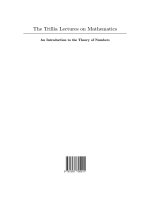
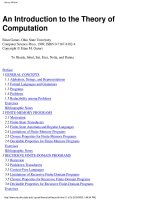
![an introduction to the theory of surreal numbers [electronic resource]](https://media.store123doc.com/images/document/14/y/pg/medium_pgk1401470100.jpg)
